CSotD: The Process-Server Always Rings Twice
Skip to commentsAnn Telnaes was out of the gate quickly as the indictments were announced, largely because she’d been following the story since it began and was able to repurpose an Oldie-but-Goodie. This is not to say that she anticipated the co-conspirators: Of these, only Giuliani was indicted.
But she echoes a commentary also advanced by Adam Zyglis before the shoe had dropped, which is that the GOP is more intent on the cover-up than the crime(s), though she is more specific about who was involved in that cover-up, while Zyglis, rather, points out the use of language to deflect from the felony.
In either case, we’re looking at a different sort of conspiracy, since loyalty to Trump has been far stronger than loyalty either to the nation or to the Republican Party. Several people have noted McConnell’s comment, following the unsuccessful attempt to convict Trump in the Senate, that there were other ways to prove, and achieve, justice.
Not so many, however, have reposted what Republican leadership said following the coup attempt.
Had McConnell remained true to his original viewpoint, had the Republicans not lined up behind the president, we’d have been spared two and a half years of sturm-und-drang, because Trump’s attempts to promote the Big Lie would have echoed in an empty well.
As it is, Dave Granlund also made a salient point prior to the handing down of the indictments, and, while the gag relies on a joke about the Plumbers vs the maintenance workers who helped attempt to conceal the stolen documents, the real distinction is that Nixon’s deceptions were carried on within the Executive Branch.
People are observing that this is the first former president indicted, but they miss two points:
One is that John Tyler died shortly after he joined the secession; had he lived to the end of the Civil War, he’d have certainly been asked to atone for his disloyalty along with the other leaders of the rebellion.
The more relevant point now is that, while a certain number of Republican legislators continued to stand behind Nixon, the great majority abandoned him once the evidence was laid before them by the Senate Watergate Committee. He was not indicted because, having lost his party’s support, he resigned and then was pardoned by Gerald Ford in a decision that continues to be debated by historians.
Some have said the Founders never anticipated our current situation. Well, neither did Gerald Ford or his contemporaries.
Yet here we are, and the question may be less about Donald Trump’s loyalty and patriotism than about that of his fellow Republicans, bearing in mind that, as Wikipedia says, he was at best an indifferent party member.
Their loyalty appears to have been to power, not party.
Clay Bennett (CTFP) offers an optimistic, if not particularly cheerful, view of what happens next. He may have seen Pence’s straightforward announcement, condemning Trump’s actions — which could bolster the ex-VP’s claim to the nomination — but it’s unlikely his cartoon was inspired by DeSantis’s bizarre pronouncement supporting his rival and promising to abandon law enforcement against powerful men if he is elected.
They can’t both be true: If Pence is seen as an honest, stand-up guy, DeSantis cannot possibly be seen in the same way, while, if DeSantis’s call for oligarchy is welcomed, Pence’s demand for constitutional government must, logically, be rejected.
Though logic may not have much to do with public response at this point. Perhaps all three signs could appear on the same lawn; it wouldn’t be the most unlikely combination we’re seen in the past two and a half years.
Still, as Jonathan Swift observed, “It is useless to attempt to reason a man out of a thing he was never reasoned into,” and there is no reason to expect MAGA loyalists to abandon Trump in the face of evidence, however obvious and clear.
David Rowe suggests that Jack Smith has all the fuel needed, plus the backing of America’s founding values, but that Trump will continue to shout “Witch hunt!” and the GOP will continue to accept donations for his defense and to wear both dark glasses and blinders, to the loyal, enthusiastic cheers of the MAGAts.
While Rowe’s fellow-Aussie, John Shakespeare, suggests that there is a great deal of meat in this nothingburger after all, and the use of Justice’s scales as a toothpick is a nice touch.
Perhaps they simply benefit from the time difference in coming up with their analysis, or maybe it’s easier to get a clear view from halfway round the world.
But much as we might wish for Randy Bish’s vision to be true, it seems optimistic beyond any reasonable expectations that Trump’s disloyalty will ever be as universally accepted as is Arnold’s, if for no other reason than that Arnold’s betrayal was long ago and has become part of American mythology.
History, once examined in detail, reveals that Aaron Burr was closer to the Trump grift than Arnold ever was. Though his disagreements with the Continental Congress were personal, Arnold wasn’t all that personally ambitious, and the impact of his betrayal stemmed from his heroism up until that point.
Burr was never mistaken for much of a hero, though he was a successful politician whose ambitions far outranked his sense of patriotism.
At a time when the rightwing is objecting to taking the names of traitors off our military bases, it seems more appropriate to think of Jefferson Davis and the Lost Cause than to compare our current crop of dissenters to Arnold.
We remain a country divided by our history, with half of us condemning the heroes of the other half.
Gary Huck gets away with a pun, but the inevitability of Trump’s upcoming arraignment does not amount to an inevitable conviction, however overwhelming the evidence.
Jack Smith was brief in his remarks, which ought to chill the hell out of Trump loyalists, but should inspire the rest of us to take his advice and actually read the indictments, while bearing in mind that our system of government — however abused it has been — still carries a presumption of innocence.
There are those who wish Merritt Garland had acted more quickly, and I’d like to think they’re too young to remember how quickly OJ Simpson was brought to trial, how obvious the evidence was against him, and how it turned out. I prefer Jack Smith’s slow, silent style.
In the words of Churchill, “this is not the end. It is not even the beginning of the end. But it is, perhaps, the end of the beginning.”
Keep your head on a swivel and your eyes on the prize.

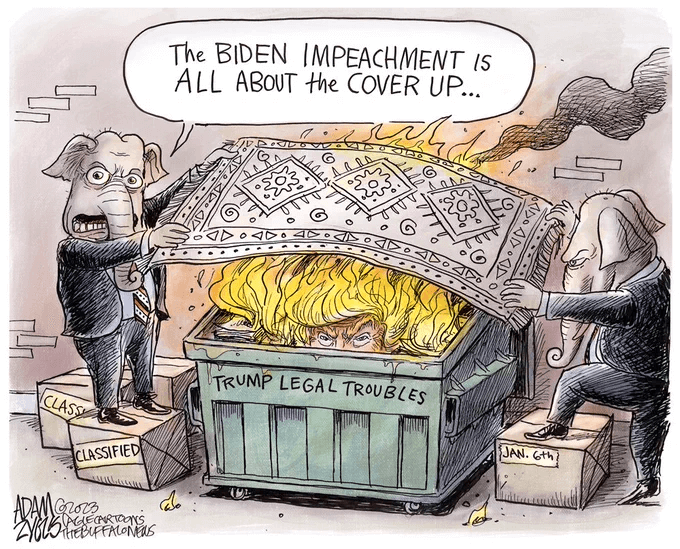
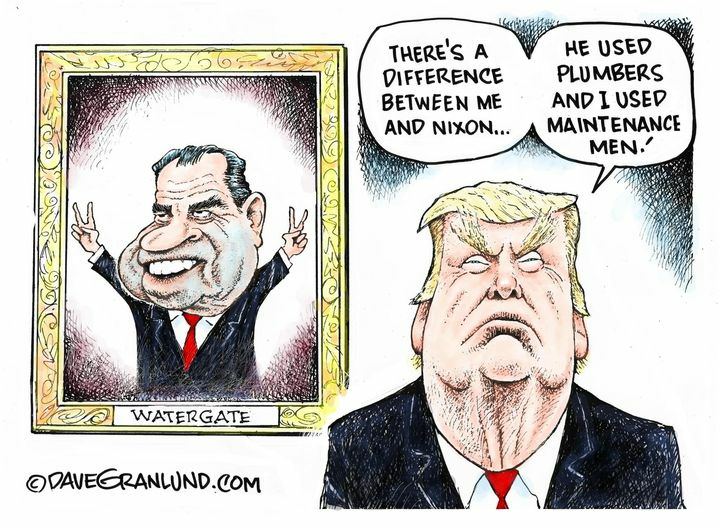

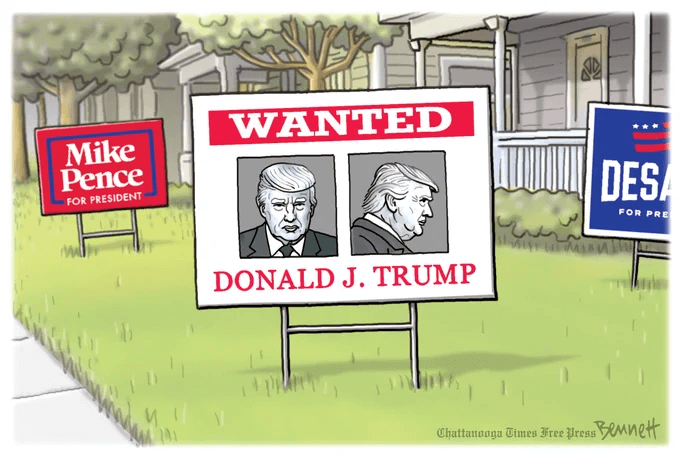
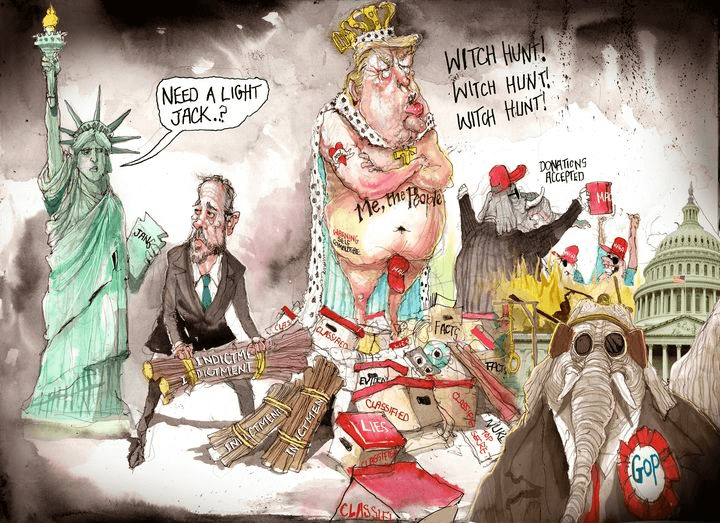
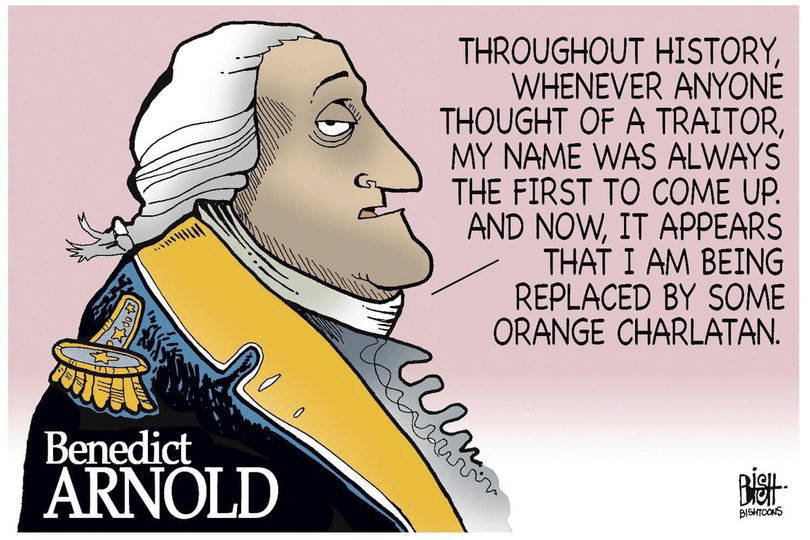

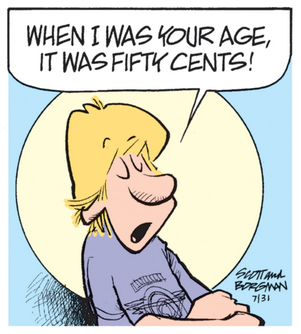
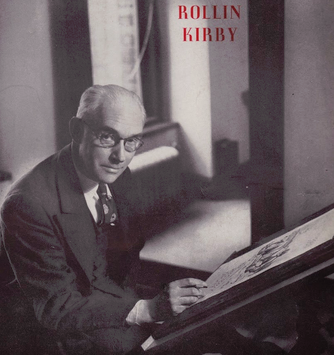
Comments 7
Comments are closed.